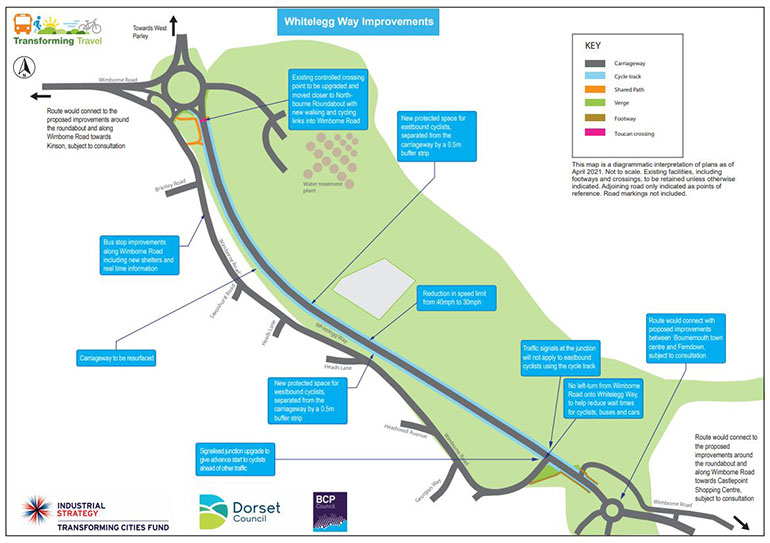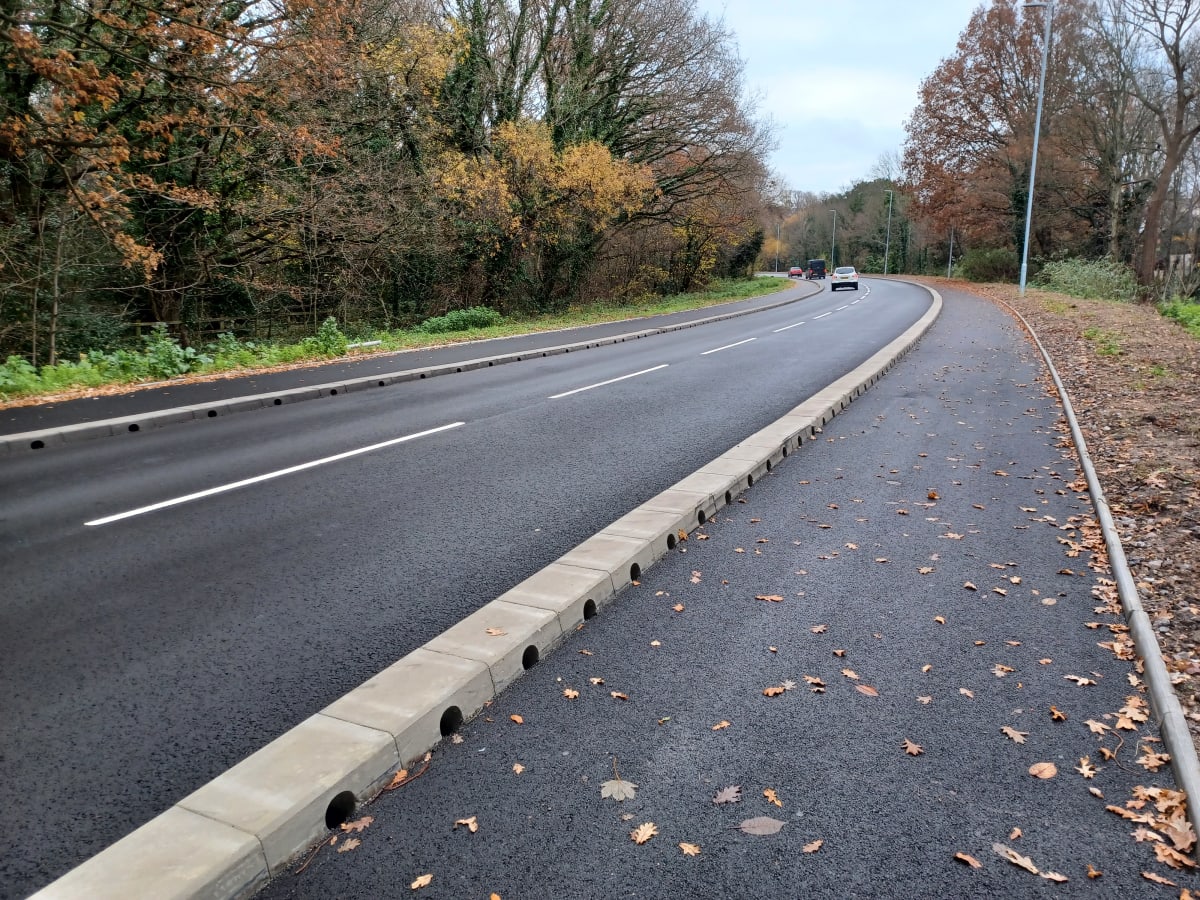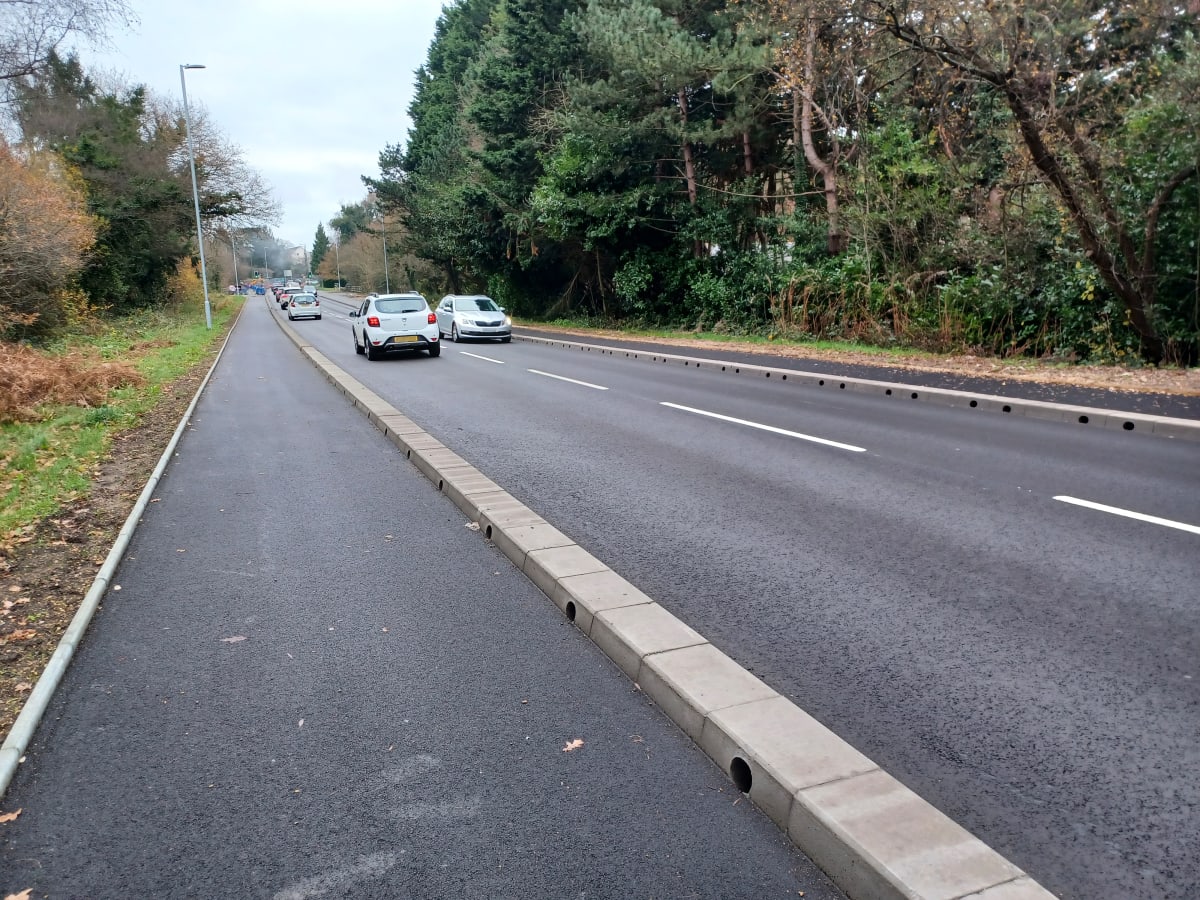Location
Whitelegg Way, Bournemouth, BH10 6AD
Client
Bournemouth, Christchurch and Poole (BCP) Council
Work is drawing to a close (March 2022) on the installation of three types of Marshalls’ innovative Beany Block CKD systems on a new cycle path.
The pair of 2m‐wide cycle lanes are part of a £102 million 'Transforming Cities Fund' programme by BCP and Dorset councils to improve sustainable travel links across south‐east Dorset.
The scheme, along Whitelegg Way between Redhill and Northbourne roundabouts, comprises a series of walking, cycling and bus improvements. They form part of the 13km sustainable travel route between Merley (Poole) and Christchurch to reduce congestion by enabling more sustainable journeys and expanding the travel choices available to people living and working in the area.
Work also included reducing the speed limit from 40mph to 30mph to make the road safer for drivers and cyclists, upgrading and relocating the existing crossing closer to Northbourne Roundabout, a four metre‐ wide toucan crossing close to Redhill Roundabout, and a raised table crossing – a traffic calming measure.
The Whitelegg Way element of the scheme is on a main route to Bournemouth Hospital and now includes 850-metre-long dedicated (segregated from traffic) cycle lanes either side of the single carriageway A347.
BCP Council, who designed the scheme and specified the Marshalls products, required a roadside (rather than verge‐side) CKD system that was flexible enough to cater for all these factors.
Both the Mini Beany and original Beany feature an innovative two‐piece design – comprising a top unit and base channel – which reduces the risk of damage during the installation process in areas with heavy or abnormally heavy wheel loads.
The Mini Beany, also delivers low to medium capacity road drainage and excellent surface water removal, were used on two radius areas of the Northbourne Roundabout, while the Standard Beany (which were used half‐battered along the remainder of Whitelegg Way), combines large flow capacity and the strongest loading classification, to E600.
The one‐piece Mono Beany, which are manufactured with a recycled inner plastic core and feature a loading classification of D400, making them suitable for all road‐going vehicles, were used across the Toucan crossing points.
Ray Gould, senior site agent with RW Civil Engineering, said: “We have worked with Marshalls on multiple schemes within the south and south‐east region and overall have a good experience using their products”.

The pair of 2m‐wide cycle lanes are part of a £102 million 'Transforming Cities Fund' programme by BCP and Dorset councils to improve sustainable travel links across south‐east Dorset.
The scheme, along Whitelegg Way between Redhill and Northbourne roundabouts, comprises a series of walking, cycling and bus improvements. They form part of the 13km sustainable travel route between Merley (Poole) and Christchurch to reduce congestion by enabling more sustainable journeys and expanding the travel choices available to people living and working in the area.
Work also included reducing the speed limit from 40mph to 30mph to make the road safer for drivers and cyclists, upgrading and relocating the existing crossing closer to Northbourne Roundabout, a four metre‐ wide toucan crossing close to Redhill Roundabout, and a raised table crossing – a traffic calming measure.
The Whitelegg Way element of the scheme is on a main route to Bournemouth Hospital and now includes 850-metre-long dedicated (segregated from traffic) cycle lanes either side of the single carriageway A347.
BCP Council, who designed the scheme and specified the Marshalls products, required a roadside (rather than verge‐side) CKD system that was flexible enough to cater for all these factors.
Marshalls' Civils & Drainage solution
Both the Mini Beany and original Beany feature an innovative two‐piece design – comprising a top unit and base channel – which reduces the risk of damage during the installation process in areas with heavy or abnormally heavy wheel loads.
The Mini Beany, also delivers low to medium capacity road drainage and excellent surface water removal, were used on two radius areas of the Northbourne Roundabout, while the Standard Beany (which were used half‐battered along the remainder of Whitelegg Way), combines large flow capacity and the strongest loading classification, to E600.
The one‐piece Mono Beany, which are manufactured with a recycled inner plastic core and feature a loading classification of D400, making them suitable for all road‐going vehicles, were used across the Toucan crossing points.
Ray Gould, senior site agent with RW Civil Engineering, said: “We have worked with Marshalls on multiple schemes within the south and south‐east region and overall have a good experience using their products”.




